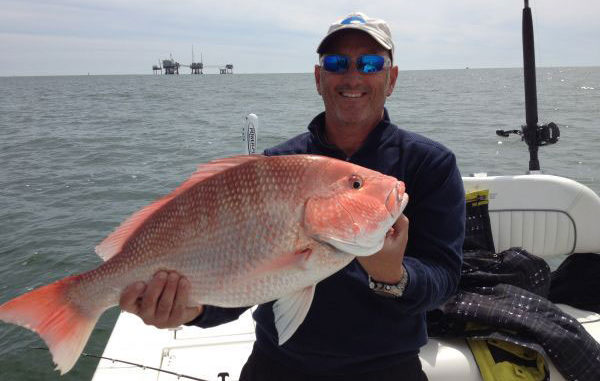
Congressman confirms Gulf states not responsible for red snapper research costs
The Louisiana Department of Wildlife and Fisheries’ contention that state-run management of red snapper would cost more than $10 million in its first year alone was undermined Wednesday when Congressional officials confirmed the federal government would still pay for stock assessments and research efforts in the Gulf of Mexico — absorbing most of the LDWF cost estimate.
The news came during LDWF’s “Red Snapper Education Day” that featured speakers hand-picked by the department to inform members of the Louisiana Wildlife and Fisheries Commission and the general public on the status of the snapper fishery.
The department, led by Secretary Charlie Melancon, has come under fire from recreational anglers since midsummer for opposing H.R. 3094, which would remove management of Gulf red snapper from the federal government and award it to the Gulf States Red Snapper Management Authority, a group comprised of representatives from each of the five states.
Congressman Garret Graves (R-Baton Rouge) sponsored the bill.
Recreational anglers — who received an 11-day federal snapper season in the Gulf this summer — have long complained the federal system is highly-politicized, mismanaged and favors commercial fishermen.
The prior LDWF administration labored for years to strip management from the Gulf of Mexico Fishery Management Council, and worked closely with Graves as the bill made its way through the Congressional process.
Melancon contended in June that an amendment offered by U.S. House Natural Resources Chairman Rob Bishop (R-Utah) to eliminate from the bill federal funding of state management was a “poison pill” designed to kill the legislation in Washington, D.C.
But a letter from Bishop read by Graves’ chief of staff Paul Sawyer on Wednesday indicated federal funding and red snapper data sharing would not be affected by H.R. 3094.
“Nothing in this amendment … impacts the (National Oceanographic and Atmospheric Administration’s) existing authority to conduct various data collection and research efforts related to (the Gulf of Mexico) reef fish stocks (including red snapper) or affects the agency’s ability to share such data and to coordinate with the states,” Bishop wrote in the letter addressed to Graves, according to The Advocate.
In July, LDWF assistant secretary Patrick Banks had estimated it would cost the department $6.4 million just to conduct stock assessments if the feds no longer paid for the research under H.R. 3094.
Chris Macaluso, a supporter of Graves’ legislation who works with the Theodore Roosevelt Conservation Partnership’s Center for Marine Fisheries, said that alone would reduce the $10 million cost estimate released in July to about $3.6 million.
“Then the federal government is providing over $1 million in enforcement, so right now you’re at $ 7.4 million in savings,” Macaluso said. “If you add in the money coming from the license sale increase, which the department already factored in, you’re at over $9 million that’s already spoken for. So we’re not talking about increasing the cost for the department by $10 million: We’re talking about increasing the cost for the department — the best I can figure — by about $500,000.
“They may dispute those numbers, but it’s just math. I’m just adding up what we know is out there. So saying you’re short $500,000 is a lot different argument than saying that you’re short $10 million.”
Coastal Conservation Association Louisiana Executive Director David Cresson agreed, saying it should be clear to everyone that Bishop’s amendment was not intended to strip federal funding and kill the bill as Melancon has asserted.
“To me, after hearing that letter, I’m not sure how money can be the stumbling block anymore,” Cresson said.
Testimony was given throughout the day by commercial fishermen, charter boat captains, the Louisiana Restaurant Association and others, but Cresson said everyone who spoke — even if they represented the status quo — actually made clear that federal management of red snapper is not working.
“Every presenter, no matter what their intention was, made the case for state management,” Cresson said. “It was so clear how each state has different fisheries and different needs amongst their sectors, and each presenter drove that point home.
“So if the meeting was useful at all, it was another illustration of why the federal system doesn’t work and we need state management.”
In April, the LWFC voted unanimously to support Graves’ legislation. But Melancon intervened when Bishop’s amendment was added earlier this summer, saying the department could not afford a mandated cost associated with state management of the fishery.
Since then, the makeup of the commission that voted unanimously in support of the legislation has changed drastically, Cresson said.
“Three members now were not on the Commission when that resolution passed unanimously,” he said. “One was removed because she made the resolution, and one or two of the spots were open at the time.
“So it’s hard to predict what the commission will do, but my belief is that every commissioner now understands how important state management of this resource is. What they do with that will be up to them.”
Despite the apparent reduction in costs outlined by Bishop’s letter on Wednesday, Cresson doesn’t see any signs that the LDWF will change course and throw its support behind the bill.
“We would certainly like to see them get on board with H.R. 3094, but my guess is they’re not there yet,” he said.
Neither Melancon nor LWFC chairman Bart Yakupzack returned phone calls seeking comment for this story.


